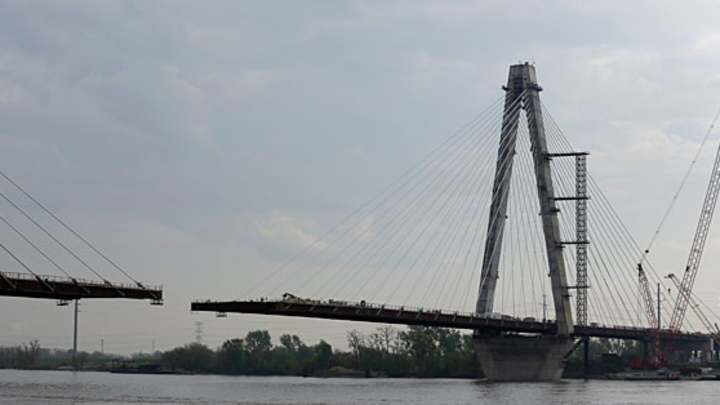Illinois, Missouri dispute naming bridge after Stan Musial


ST. LOUIS (AP) -- Bickering between Missouri and Illinois over how to fund the sorely needed Mississippi River bridge at St. Louis stalled the $670 million project for years. Now that construction is in full swing, the two states are at it again, debating what the span should be named - and who has the prevailing authority to do it.
The spat deepened this week, when the Illinois House voted 109-0 on a resolution for the Interstate 70 crossing to be dubbed the Veterans Memorial Bridge. Never mind that Missouri lawmakers and key members of Congress from both states insist it should bear the name of late St. Louis Cardinals icon Stan "The Man" Musial -"the Stan Span," for short.
The two ideas have at least one commonality, albeit slight: Musial, the Hall of Famer and Presidential Medal of Freedom recipient who died in January at age 92, was a veteran, having served in the Navy during World War II.
Beyond that, there's little to bridge the states' divide over what to call the region's first span across the Mississippi in more than four decades.
Leading the charge on the Veterans Memorial Bridge moniker, Illinois Rep. Jay Hoffman - a Democrat from Belleville, 20 miles east of St. Louis and a towering Musial statue gracing Busch Stadium - insisted that "by naming this bridge in memory of the men and women who have served our nation, we are honoring them on a daily basis."
Hoffman said making veterans the namesake of the crossing - scheduled to open next year - would become official if the Illinois Senate and Missouri lawmakers agree to it.
That prospect appears as murky as the river itself.
In April, the Missouri House voted 147-0 in favor of a measure naming the span the Stan Musial Memorial Bridge, adding momentum to the push by Cardinals fans since Musial's death. The Missouri Senate overwhelmingly signed off on that idea last week, sending the measure back to the House with amendments.
And in March, the U.S. Senate unanimously passed a bill to name the span after Musial, the three-time MVP and seven-time batting champ who spent his entire 22-year career with the Cardinals and help guide them to three World Series titles.
The congressional measure - introduced by Missouri Democrat Claire McCaskill, her Republican colleague, Roy Blunt, and their Illinois counterparts - now is being considered by the House.
"Stan was a true hero to so many Americans, both on and off the field," Blunt after the measure advanced. "This is a great way for us remember his legacy for years to come."
A spokeswoman for Sen. Dick Durbin, an Illinois Democrat, recently suggested that whatever the states decide may be moot, insisting that Congress and the president hold naming rights because the project involves federal aid - some $240 million of it.
To McCaskill, honoring Musial is a no-brainer.
"As most St. Louisans know, folks that live on the Illinois side of the St. Louis region are by and large Cardinals fans," she told The Associated Press recently. "They aren't cheering for the (Chicago) Cubs. I think it (naming the bridge) is something that unites the two states."
Fat chance, given the years Missouri and Illinois spent feuding before the first shovel was turned on the planned four-lane, cable-stayed bridge meant to relieve the 50-year-old Poplar Street Bridge, one of just two in the nation that accommodate three freeways.
As part of a lingering squabble over how to finance the bridge, Missouri insisted that it be a tollway - a notion flatly rejected by Illinois as potentially onerous for tens of thousands of its residents who commute daily to St. Louis and its Missouri suburbs.
Illinois later proposed a sister bridge to an existing span, calling it affordable at $450 million. Missouri said it wasn't a long-term solution.
Both states ended the impasse in early 2008, announcing a compromise after Missouri relented on the tolls.
